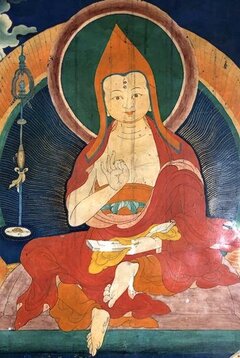Chinese Yoginī’s Advice to Vairotsana
English | Deutsch | Français | བོད་ཡིག
The Chinese Yoginī Chudunma’s Advice to Vairotsana
from The Great Image Biography compiled by Yudra Nyingpo
Then Vairotsana requested instruction from a wise Chinese mendicant, yoginī, and hermitess, who said:
If you seek enlightenment, let go of striving.
If you seek to watch the mind, focus on the breath.
If you seek wisdom, constantly apply mindfulness.
If you seek bliss, check whether you’ve found the essence of the five poisons.
If you seek enlightenment, you have failed.
This is what the ḍākinī said to Vairotsana.
Then Vairotsana asked the Chinese yoginī about the definitive meaning. The hermitess Chudunma replied by saying:
With the realization of space-like purity,
Virtue and non-virtue are mere conventions;[1]
Suffering and saṃsāra have never existed.[2]
There is no effort towards unborn dharmas.
There is no liberation, for there is no bondage.
There has never been an 'essence of awakening'.
Those childlike ones who fail to realize this
And chase in vain after supposed enemies
Entirely forsake all virtuous dharmas.
They cling to and hanker after the things of saṃsāra.
Confused, they wander through the lower realms.[3]
This is the advice she gave to the bhikṣu Vairotsana.
Extracted from the Image of Vairotsana.
| Translated by Adam Pearcey, 2023.
Bibliography
Tibetan Editions
"rgya nag gi rnal 'byor ma chu dun mas bai ro tsa na la gdams pa" In mkha' 'gro’i chos mdzod chen mo. 53 vols. Lhasa: Bod ljongs bod yig dpe rnying dpe skrun khang, 2017. Vol. 21: 115
rgyal mo g.yu sgra snying po & khams smyon dharma sengge. bai ro tsa na’i rnam thar 'dra 'bag chen mo. Lhasa: (BDRC W1KG1607) 105b–106a.
Secondary Sources
Palmo, Ani Jinba. The Great Image: The Life Story of Vairochana the Translator. Boston: Shambhala Publications, 2004.
Version: 1.0-20230322
-
Following the 'dra 'bag chen mo edition which has dge sdig (virtue and non-virtue/vice) while the Ḍākinī Treasury has dge sdug (virtue and suffering), but then following the Ḍākinī Treasury, which has tha snyad (conventions) in place of tha dad (distinctions). ↩
-
Following the 'dra 'bag chen mo edition which has sdug bsngal (suffering), while the Ḍākinī Treasury has bdud dang (demons and…). ↩
-
Following the 'dra 'bag chen mo edition (106a) here, which has 'thoms (confused), while the Ḍākinī Treasury edition has mthong (seeing). ↩
